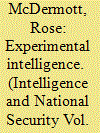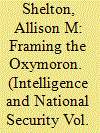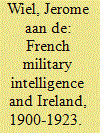| Srl | Item |
| 1 |
ID:
103578


|
|
|
|
|
| Publication |
2011.
|
| Summary/Abstract |
This article explores the use and application of experimental methodologies in intelligence analysis. Previous experimental work has much to tell us about how people process information in making judgments. Calibration, and how appropriate levels of confidence might be improved with systematic feedback, is addressed. Training around uncertainty biases is covered. Extant experimental work suggests mechanisms and tests which might be used to better screen potential analysts for personality characteristics that might make them more suited for some tasks over others. The paradigm of experimental manipulation serves as a useful template for exploring alternative conceptualizations of uncertain environments.
|
|
|
|
|
|
|
|
|
|
|
|
|
|
|
|
| 2 |
ID:
103570


|
|
|
|
|
| Publication |
2011.
|
| Summary/Abstract |
Despite some arguments to the contrary, I argue that because ethics benefit, rather than harm, the intelligence profession they should be considered an inherent part of intelligence studies. The literature largely presents intelligence ethics as a two-sided debate between teleologists and deontologists. I propose that ethical justifications should instead be considered along a progressive spectrum drawn from the work of moral psychologist Lawrence Kohlberg. Such a spectrum has numerous applications for gauging the moral arguments of individual practitioners of intelligence. I illustrate this using the dilemma of targeted political assassination - first in a hypothetical context, and finally using examples from the investigations of the 1975 Church Committee.
|
|
|
|
|
|
|
|
|
|
|
|
|
|
|
|
| 3 |
ID:
103573


|
|
|
|
|
| Publication |
2011.
|
| Summary/Abstract |
As many unused sources in the Service Historique de la Defense in Vincennes and the Quai d'Orsay in Paris reveal the French Deuxieme Bureau, and also naval intelligence, monitored events during the home rule crisis, the Easter Rising, the First World War, the Peace Conference in Paris and the Civil War. Also worthy of note are the elaboration of Franco-Irish invasion plans during the Boer War and the secret mission of an Irish general in Paris shortly after the signing of the Anglo-Irish Treaty on 6 December 1921. The aims of this article will be to give an overview of French military intelligence activities regarding Ireland and to give an assessment of its interest in the country during the period under consideration.
|
|
|
|
|
|
|
|
|
|
|
|
|
|
|
|
| 4 |
ID:
103567


|
|
|
|
|
| Publication |
2011.
|
| Summary/Abstract |
The British Broadcasting Corporation began recording, translating and publishing selected open radio broadcasts by foreign stations at the beginning of World War II. This open source intelligence, or 'Osint', was provided to the United States starting in 1941, and America's own monitoring agencies reciprocated, albeit with certain key restrictions. By mid-1943 the BBC monitored 1.25 million broadcast words daily. At the war's end, questions arose in Whitehall about maintaining the BBC Osint operation, but an interagency coalition prevailed over the cost-conscious Treasury. US-UK Osint exchanges broadened after the war as part of a larger set of bilateral intelligence-sharing agreements.
|
|
|
|
|
|
|
|
|
|
|
|
|
|
|
|
| 5 |
ID:
103576


|
|
|
|
|
| Publication |
2011.
|
| Summary/Abstract |
Despite the CIA's improved analytical tradecraft and increased resources, the future of its analytic mission remains in doubt. Post-9/11 improvements have been coupled with a continued focus on current intelligence priorities that minimize attention to the development of strategic research and deeper knowledge. Simply increasing the number of analysts has not produced deeper expertise. The CIA's traditional recruitment and training methods, as well as its rewards and promotion system, encourage analysts to avoid concentrating on any single area of regional or functional expertise in favor of moving around the agency to build a successful career. A continued reliance on risk-avoidance security practices also restricts analysts' contact with non-government and foreign experts who often have needed political and cultural knowledge of intelligence topics. To rectify these inadequacies, the CIA's analytic directorate needs to develop incentives for analysts who wish to develop more strategic analysis and remove the security barriers to closer collaboration with experts outside the US government. Developing cross-agency analytic collaboration would also maximize expertise and would benefit from intelligence community-wide training programs similar to what the US military does at its senior service colleges.
|
|
|
|
|
|
|
|
|
|
|
|
|
|
|
|
| 6 |
ID:
103580


|
|
|